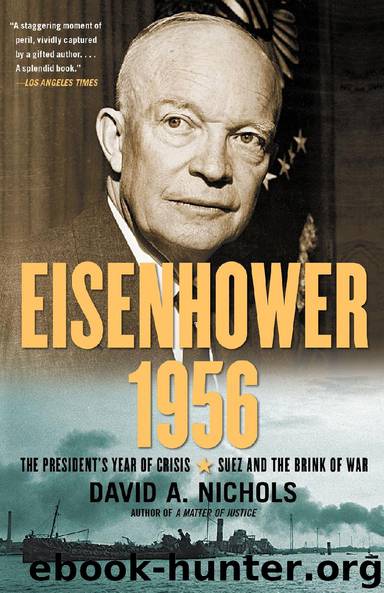Eisenhower 1956 by David A. Nichols

Author:David A. Nichols
Language: eng
Format: epub
Publisher: Simon & Schuster Paperbacks
MISLEADING THE AMBASSADORS
Ambassadors Aldrich in London and Dillon in Paris present a case study in ambassadorial misjudgment. They completely missed the signals that the allies had agreed upon a full-scale program of deception. On being informed of Dulles’s argument with Selwyn Lloyd, Aldrich went to see the British foreign minister. Lloyd charmed Aldrich into believing that Washington was exaggerating a conflict over short-term tactics for pressuring Egypt by impounding canal tolls. Aldrich advised Dulles, “I believe the situation is fundamentally less divergent than the two communications so far exchanged would suggest, at least in relation to the long term.” He continued, “I do feel that the govt is disposed to try to promote a solution through negotiations rather than the contrary.” The ambassador could not have been more wrong. 81
Douglas Dillon was no less gullible. He ran into the same ruse that Lloyd had used to mislead Aldrich—that the difference between the French and American positions “was one of time table.” The French misled Dillon with smoke screen number two, that the impounding of canal dues in the interim would pressure the Egyptians to make a final settlement. SCUA would go fully into effect around November 1, with toll payments to the association beginning after the American election. Dillon took this to mean that the French did “not contemplate any military action prior to approximately Nov. 10.” A high source within the French government had convinced him that the French “do not want military action and hope to avoid it.” 82
Neither Dulles nor his ambassadors understood that this dialogue was a hoax. Dulles, weary and frustrated, had swallowed the pretense that the administration of SCUA was a real issue, writing Lloyd again about how “disturbed” he was by the foreign minister’s willingness to abandon the original idea of SCUA—an “on-the-spot” practical arrangement with Egypt that would, “in fact, amount to an international participation in the operation of the Canal.” U.N. Ambassador Lodge reported to Dulles that Secretary-General Hammarskjöld had learned that Nasser was open to SCUA becoming a useful negotiating body “without the taint of being a pressure device—if it were, he would not play with it.” Lodge, along with the rest of the diplomatic corps, mistakenly concluded that “things are in good shape.” 83
Foster Dulles’s anxieties were heightened when on October 19 a message arrived from Nikolai Bulganin. 84 The Soviet premier alluded to Adlai Stevenson’s proposed ban on nuclear testing, called for an “unconditional prohibition” of nuclear weapons, impugned the integrity of the secretary of state, and accused the president of “bad faith.” Eisenhower was campaigning in the West and could not deal with the message until he returned. Dulles was beside himself about it. The evening of October 20, he interrupted his attendance at the musical Auntie Mame at the National Theatre to call Hagerty and the president about the message. Dulles later told General Beetle Smith, the retired CIA director, that there had “never been a diplomatic note so crass as this one.” Dulles hoped that
Download
This site does not store any files on its server. We only index and link to content provided by other sites. Please contact the content providers to delete copyright contents if any and email us, we'll remove relevant links or contents immediately.
| American Revolution | Civil War |
| US Presidents |
Fanny Burney by Claire Harman(26603)
Empire of the Sikhs by Patwant Singh(23086)
Out of India by Michael Foss(16853)
Leonardo da Vinci by Walter Isaacson(13336)
Small Great Things by Jodi Picoult(7142)
The Six Wives Of Henry VIII (WOMEN IN HISTORY) by Fraser Antonia(5515)
The Wind in My Hair by Masih Alinejad(5095)
A Higher Loyalty: Truth, Lies, and Leadership by James Comey(4964)
The Crown by Robert Lacey(4817)
The Lonely City by Olivia Laing(4802)
Millionaire: The Philanderer, Gambler, and Duelist Who Invented Modern Finance by Janet Gleeson(4478)
The Iron Duke by The Iron Duke(4356)
Papillon (English) by Henri Charrière(4274)
Sticky Fingers by Joe Hagan(4198)
Joan of Arc by Mary Gordon(4110)
Alive: The Story of the Andes Survivors by Piers Paul Read(4032)
Stalin by Stephen Kotkin(3965)
Aleister Crowley: The Biography by Tobias Churton(3640)
Ants Among Elephants by Sujatha Gidla(3467)
